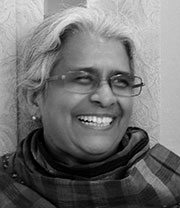Series to Highlight Women in Signal Processing: Dr. Hema A. Murthy

 Dr. Hema A. Murthy received the bachelor's degree from Osmania University, Hyderabad, India, in 1980, the master's degree from McMaster University, Hamilton, Canada, in 1986, and the Ph.D. degree from the Indian Institute of Technology (IIT) Madras, Chennai, India, in 1992. She is currently a Professor with the Department of Computer Science and Engineering, IIT Madras.
Dr. Hema A. Murthy received the bachelor's degree from Osmania University, Hyderabad, India, in 1980, the master's degree from McMaster University, Hamilton, Canada, in 1986, and the Ph.D. degree from the Indian Institute of Technology (IIT) Madras, Chennai, India, in 1992. She is currently a Professor with the Department of Computer Science and Engineering, IIT Madras.
Her research interests include speech processing, computer networks, music information retrieval, computational brain research, and other areas of machine learning and signal processing.
We approached her with a few questions.
Q. Please tell us about yourself and your background.
I have fascinated about dabbling with different types of signals. I started my career with the image classification of ice-radar images (McMaster University Canada, 1986). This is was my first introduction to statistical signal analysis. I then moved back to India and started working with speech signals. At that time (1986), there were still a large number of efforts on speech analysis. I started looking at the phase spectrum and developed a way to extract useful features from phase using group delay functions. This lead to a feature called "Modified Group Delay Feature" which received a lot of traction in speaker recognition, and anti-spoof detection. I did a post-doc stint at SRI (1995-96, 2002 (3 months)), where I worked on making the decipher front-end robust. I also got a good grip on classical machine learning used in speech.
Ever since, I have become interested in using signal processing to guide machine learning. We have been successful in "text to speech synthesis for low (digital) resource Indian languages. " I also started dabbling with Network time series to detect DDOS attacks, music processing for Indian music which is an oral tradition, and brain signals, where our primary objective is to invert EEG signals to speech.
I would describe the various efforts as leading to a checkered career, but I have most importantly always been happy with whatever I have done so far. This keeps me focussed especially in an environment that is so male-dominated.
Q. How does your work affect society?
I work in two areas that are useful for society. Working on low resource Indian languages. We have built screen readers for the visually challenged, we have offered online lessons to first generation learners to prepare for school final exams. Also, we are currently working on BCIs for speech and motor-impaired.
Q. What challenges you had to face to get where you are today?
The glass ceiling was and is always there. People seldom like a vocal woman.
Q. What advice would you give to scientists/engineers in signal processing?
Focus on the work without looking for rewards, the rewards will follow.
Q. Anything else that you would like to add?
Encourage more women into engineering and in particular signal processing and machine learning.

